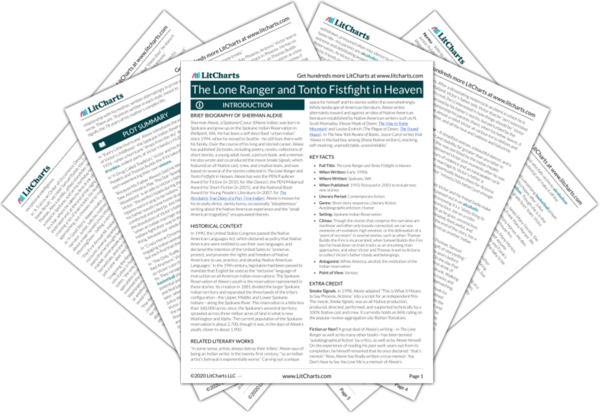Summary
Analysis
On the morning of his birthday, Samuel Builds-the-Fire—grandfather to Thomas, and a visionary storyteller himself—dresses and readies for work. He is a maid at a motel in Spokane. He makes very little money, but takes pride in his work. Though his walk from his apartment to the motel only takes five minutes, he leaves home half an hour early. He has not received any cards or letters from his children, who are scattered all over the country, and though he is “hurt some, he [understands] that his children [are] busy, busy, busy.” When Samuel arrives at work, his manager pulls him aside to the back office, where he lets him go from his job. Samuel takes his severance check and leaves.
Samuel is an innocent; he takes great pride in his middling job, he makes excuses for his selfish children, and he shoulders every slight with acceptance and understanding. Despite being an older man, his naïveté is remarkable, and provides a setup for Samuel’s indoctrination into the ways of the world.
Themes
Samuel heads to the Midway Tavern, where he knows “all the Indians drink in eight-hour shifts.” Samuel considers the idea that God is just the planet’s maid. Samuel has never been fired and has never been in a bar or had a drink of alcohol. He sits down in the bar and asks for a menu. The bartender, laughing, serves him a beer. Samuel takes a drink, and thinks: “I understand everything.”
Samuel, though aware of the effects that alcohol can have, puts himself in the line of fire anyway, and succumbs to the alluring escape from his problems that alcohol offers. What he “understands” is left unclear, but it its perhaps the brief consolation from general misery that so many Native people have found in alcohol.
Themes
Samuel reveals that he never drank for fear it would “corrupt his stories,” which he used as a way to “make [the] worlds” of his friends, children, and grandchildren “into something better.” Now, though, his children have left him alone, and all of his friends have died. No one has time for his stories and visions anymore.
Samuel clung for so long to the power his stories held. Now, in the throes of the pain, isolation, and loss that the dissolution of his power as a storyteller has brought on, he surrenders to vice, unable to believe any longer in the value of his stories.
Themes
Samuel stays in the bar until closing time. Then he staggers through Spokane, drunk and alone, and falls “face down” onto the Union Pacific Railroad tracks. He can hear a train’s whistle approach and feel the tracks vibrate beneath him. Samuel closes his eyes, “pretending to be asleep.”
Samuel, with nothing, he feels, left to live for, puts himself in the path of an oncoming train and does nothing to move or escape. The railroad again calls back to historical and cultural suffering, as it was an early marker of white expansion into and “development” of Native lands.
Themes
Get the entire Lone Ranger and Tonto Fistfight in Heaven LitChart as a printable PDF.













